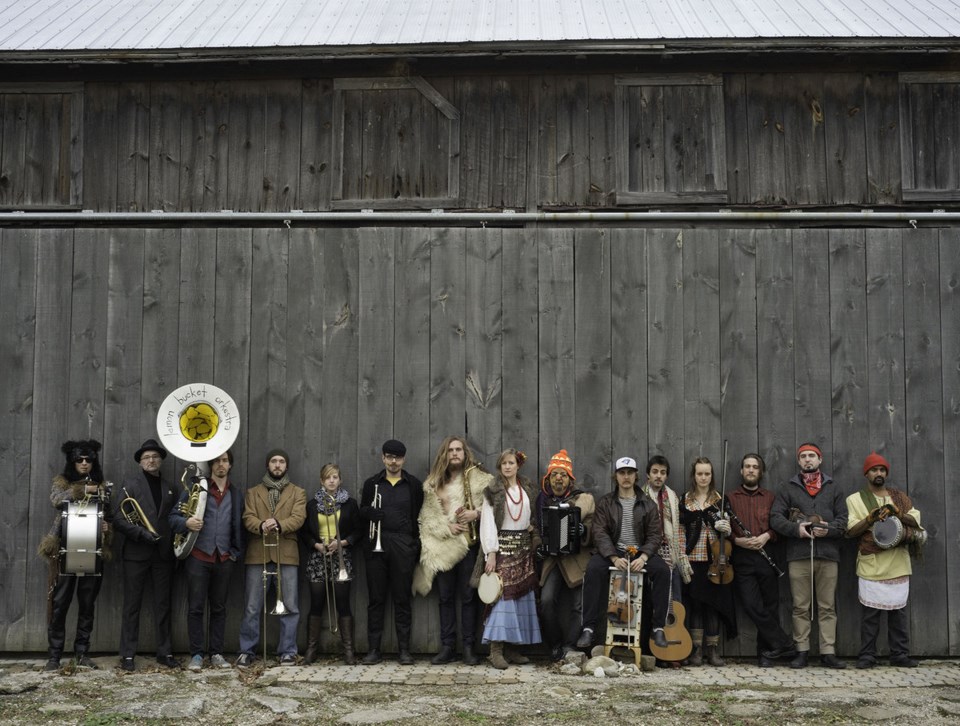Lemon Bucket Orkestra, Capilano University, Thursday, April 14, 2016 at 8 p.m. Tickets: $28/$25. For more information visit capilanou.ca.
“Experience Ukraine! We are open for tourism.”
That’s Ukraine’s real travel slogan. “Discover music, witness revolution and fall in love” is probably better, but it may only be applicable to Mark Marczyk.
The Toronto-born violinist and leader of Lemon Bucket Orkestra (imagine if Kool and the Gang rocked shaggy hair and flugelhorns) owes much of his life to the mountainous country on the Black Sea.
The first time he hit Ukraine he was in his early 20s, and after falling in with some buskers who realized Marczyk played violin as a kid, his life changed.
“They found me a fiddle … and I started playing on the street with them and it just took over my life,” he said.
Marczyk went back to Toronto to earn a creative writing MFA at the University of Guelph-Humber, but much like people with similar secrets tend to find each other, he once more found himself among musicians.
There was a player from France, another from Mexico, and all three shared a yearning.
They wanted to play music that was alive at the table or in a street, as spontaneous as a shout.
“That slowly grew into the Lemon Bucket Orkestra,” he says.
They’ve made good on their pledge to spontaneity, blasting through klezmer tunes while waiting for the luggage to load on an Air Canada flight or cranking up the sousaphone at a Toronto railway station.
The band was garnering an international following when Marczyk headed back to Ukraine.
He was there to work on a film score but ended up chronicling – and participating in – a revolution.
Teachers, pensioners, priests, rabbis, lawyers, students and a host of other Ukrainians disenchanted with what they saw as a corrupt, pro-Russia government took over the centre of Kiev, Ukraine’s capital city.
They took over the cultural centre, the palace of art and city hall.
Marczyk had observed the Orange Revolution a decade earlier and was skeptical about what he was seeing, at first.“It had gotten to such a point, that they said we can’t live like this anymore. … We’re going to be here. We’re going to stand here and support each other.”
They weathered temperatures well below zero, a blizzard, as well as riot cops “who don’t know any better,” according to Marczyk.
One protester made sandwiches, another chopped wood, some served as night security to ensure “no drunk provocateurs meandered into the protest site.”
There was a no-alcohol rule, Marczyk explains.
“I was totally shocked, especially being a Ukrainian myself and knowing how huge drinking culture is.”
He played a little music during the day, but mostly what Marczyk did was talk to people. He wanted to find out what protesters were doing, examine how the revolution was bringing people together and explore the “beautiful parts of the protest.”
One of those beautiful parts was meeting his wife, who would later collaborate with Marczyk on a folk opera inspired by the revolution entitled Counting Sheep.
The revolution was successful, the president was ousted, and shortly afterward, Russia annexed Crimea and troops stormed into the country.
“We had a war on our hands.”
Marczyk left, but not for the reasons you might expect. He left because he was supposed to record a new album with Lemon Bucket Orkestra.
“I lasted one rehearsal. By the end of the rehearsal I said to everybody, ‘Listen, I’m sorry, we’re going to have to postpone recording this album. I have to go back to Ukraine,’” he recalls saying. “I don’t know what the purpose is or if there is a purpose, but I feel incredibly drawn to using, I guess, my skill set, using my ability to make music and to draw people together through music, and also my ability to tell a story.”
Protesters were donning military fatigues to repel Russian forces when he went back.
“We were travelling around the country at that point, playing these songs of revolution.”
Despite his experience, Marczyk is noncommittal about being a political performer, instead describing what he does as celebrating life and culture through music.
“Sometimes that celebration gets sidetracked by other things,” he acknowledges.
There’s more to the story, but Marczyk is due for sound check before a show in Banff.
“I’m being called to the stage.”



